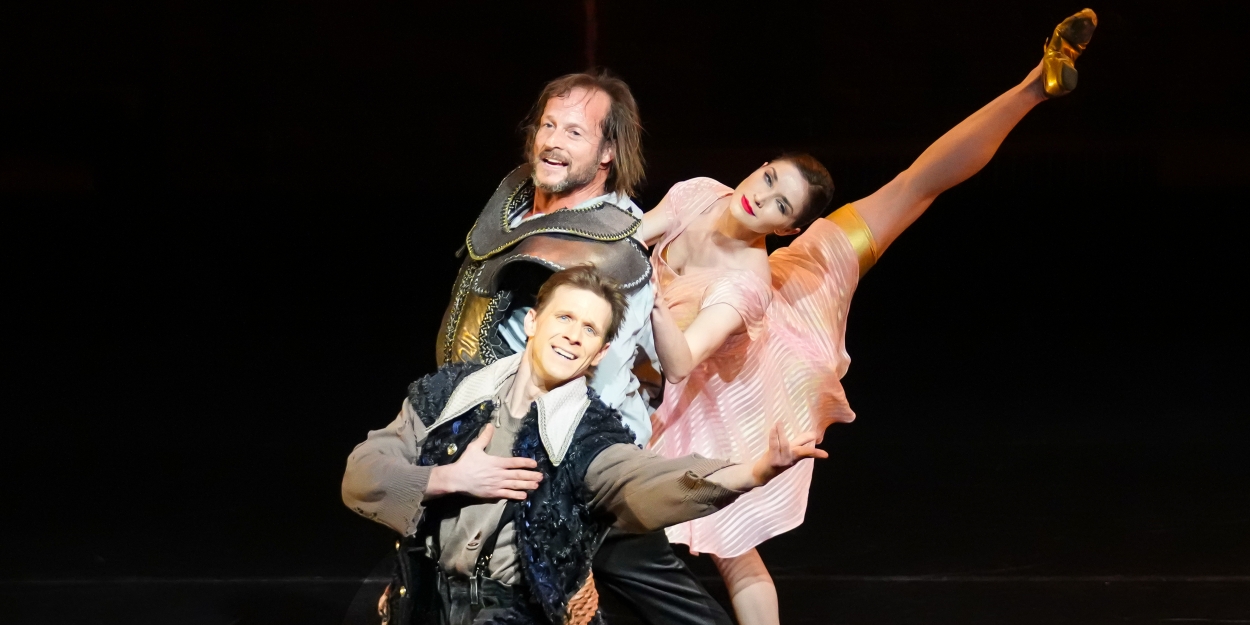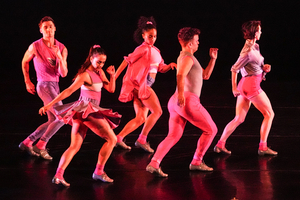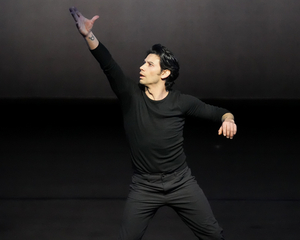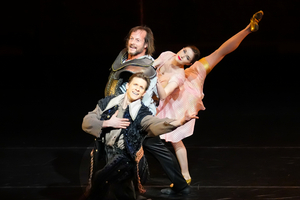Review: TWYLA THARP Dance Sizzles with A Triumphant Program at The Joyce
The production runs from February 13th-25th.

 I always arrive to shows twenty minutes before the curtain rises.
I always arrive to shows twenty minutes before the curtain rises.
Call it habit, anticipation, excitement. But on the night of February 13th, I arrived to The Joyce early because only Twyla Tharp can bring out the singular energy that was in the room. The air was crackling with enthusiasm, as audience goers bubbled and gushed about the evening ahead.
Up first was Ocean’s Motion, a beloved work which first premiered in 1975. Set to a variety of music from Chuck Berry, this piece is a dreamy love letter to the 1950s, complete with swinging ponytails and synchronized bubble gum chewing. The twist, the bunny hop, the fun! The choreography is both timeless and effortlessly cool, and the secret lies in the athleticism that's demanded. Tharp doesn’t just put together steps; she creates an entire world—a vibe, a swagger—that transports us to a place both familiar and current. In Ocean’s Motion, Tharp’s marriage of pedestrian movement—walking, jumping—coupled with the dynamic excellence of her elite dancers, left the audience in rapturous applause.
 What followed was a dramatic shift: the world premiere of Brel, set to a selection of the artist’s music danced by American Ballet Theatre standout, Herman Cornejo. Donning all black, Cornejo is striking, both physically and rhythmically. The piece began as a meditation; slow and careful, as he thoughtfully explored the stage. When the music began to build, Cornejo’s movement became larger and grander. There’s no denying that his technique is near flawless; but I found myself wanting more. The movement’s cadence was start-and-stop; staccato in a way that surprised me. Just as it would escalate, the movement would slow down instantly. In essence, Cornejo was tempting the audience with his dance soliloquy, keeping us all on the literal edge of our seats. There was one particularly exciting series of jetés en manège where I could hear audible gasps.
What followed was a dramatic shift: the world premiere of Brel, set to a selection of the artist’s music danced by American Ballet Theatre standout, Herman Cornejo. Donning all black, Cornejo is striking, both physically and rhythmically. The piece began as a meditation; slow and careful, as he thoughtfully explored the stage. When the music began to build, Cornejo’s movement became larger and grander. There’s no denying that his technique is near flawless; but I found myself wanting more. The movement’s cadence was start-and-stop; staccato in a way that surprised me. Just as it would escalate, the movement would slow down instantly. In essence, Cornejo was tempting the audience with his dance soliloquy, keeping us all on the literal edge of our seats. There was one particularly exciting series of jetés en manège where I could hear audible gasps.
 The finale of the program was the world premiere of The Ballet Master. John Selya and Daniel Ulbricht play a disgruntled ballet master and assistant, who are annoyed by the unenthused dancers they’re rehearsing. In dramatic fashion, a cloaked Cassandra Trenary arrives, bourréing on stage with impossible speed; this can only signal one thing: classic dream sequence. The audience, in on the meta nature of the joke, was deeply engaged as suddenly, all the dancers transformed from “classical ballet” to “Twyla Tharp ballet.” As expected, the dancing from Selya, Ulbricht, and Trenary was pristine. But more than that, they transcended the movement through their artistry and natural chemistry with one other, peppering their performances with ease and joy of dance.
The finale of the program was the world premiere of The Ballet Master. John Selya and Daniel Ulbricht play a disgruntled ballet master and assistant, who are annoyed by the unenthused dancers they’re rehearsing. In dramatic fashion, a cloaked Cassandra Trenary arrives, bourréing on stage with impossible speed; this can only signal one thing: classic dream sequence. The audience, in on the meta nature of the joke, was deeply engaged as suddenly, all the dancers transformed from “classical ballet” to “Twyla Tharp ballet.” As expected, the dancing from Selya, Ulbricht, and Trenary was pristine. But more than that, they transcended the movement through their artistry and natural chemistry with one other, peppering their performances with ease and joy of dance.
The night was so fun. I’m grateful to Twyla Tharp for reminding us all that at its core, dance should always be just that.
Photo Credit: Steven Pisano
Reader Reviews

Videos

